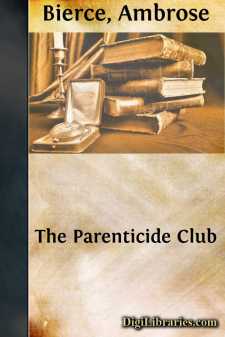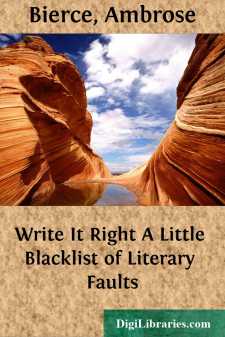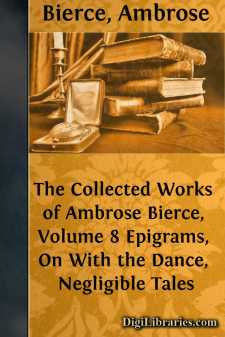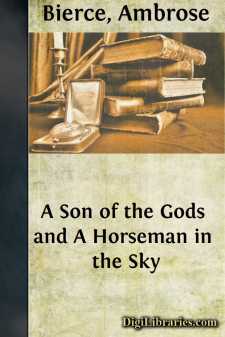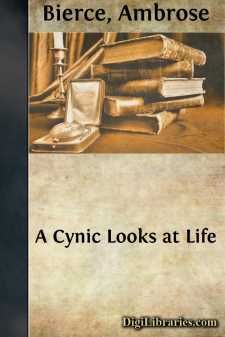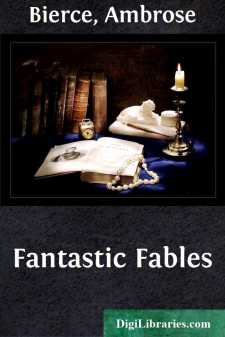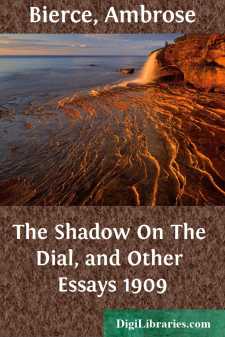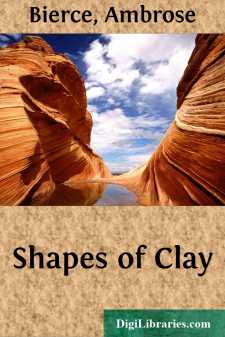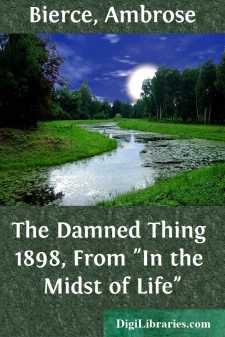Categories
- Antiques & Collectibles 13
- Architecture 36
- Art 48
- Bibles 22
- Biography & Autobiography 813
- Body, Mind & Spirit 142
- Business & Economics 28
- Children's Books 17
- Children's Fiction 14
- Computers 4
- Cooking 94
- Crafts & Hobbies 4
- Drama 346
- Education 46
- Family & Relationships 57
- Fiction 11829
- Games 19
- Gardening 17
- Health & Fitness 34
- History 1377
- House & Home 1
- Humor 147
- Juvenile Fiction 1873
- Juvenile Nonfiction 202
- Language Arts & Disciplines 88
- Law 16
- Literary Collections 686
- Literary Criticism 179
- Mathematics 13
- Medical 41
- Music 40
- Nature 179
- Non-Classifiable 1768
- Performing Arts 7
- Periodicals 1453
- Philosophy 64
- Photography 2
- Poetry 896
- Political Science 203
- Psychology 42
- Reference 154
- Religion 513
- Science 126
- Self-Help 84
- Social Science 81
- Sports & Recreation 34
- Study Aids 3
- Technology & Engineering 59
- Transportation 23
- Travel 463
- True Crime 29
Ambrose Bierce
Ambrose Bierce (1842–1914?) was an American short story writer, journalist, poet, and Civil War veteran, best known for his sardonic wit and pessimistic view of human nature. His most famous works include the short story "An Occurrence at Owl Creek Bridge" and the satirical lexicon *The Devil's Dictionary*. Bierce disappeared in 1913 while traveling to Mexico to observe the Mexican Revolution, and his fate remains a mystery.
Author's Books:
Sort by:
by:
Ambrose Bierce
MY FAVORITE MURDER Having murdered my mother under circumstances of singular atrocity, I was arrested and put upon my trial, which lasted seven years. In charging the jury, the judge of the Court of Acquittal remarked that it was one of the most ghastly crimes that he had ever been called upon to explain away. At this, my attorney rose and said: "May it please your Honor, crimes are ghastly or...
more...
by:
Ambrose Bierce
AIMS AND THE PLAN The author's main purpose in this book is to teach precision in writing; and of good writing (which, essentially, is clear thinking made visible) precision is the point of capital concern. It is attained by choice of the word that accurately and adequately expresses what the writer has in mind, and by exclusion of that which either denotes or connotes something else. As...
more...
by:
Ambrose Bierce
My name is John Brenwalter. My father, a drunkard, had a patent for an invention, for making coffee-berries out of clay; but he was an honest man and would not himself engage in the manufacture. He was, therefore, only moderately wealthy, his royalties from his really valuable invention bringing him hardly enough to pay his expenses of litigation with rogues guilty of infringement. So I lacked many...
more...
by:
Ambrose Bierce
The Introduction Brilliant and magnetic as are these two studies by Ambrose Bierce, and especially significant as coming from one who was a boy soldier in the Civil War, they merely reflect one side of his original and many-faceted genius. Poet, critic, satirist, fun-maker, incomparable writer of fables and masterly prose sketches, a seer of startling insight, a reasoner mercilessly logical, with the...
more...
by:
Ambrose Bierce
I The question "Does civilization civilize?" is a fine example of petitio principii, and decides itself in the affirmative; for civilization must needs do that from the doing of which it has its name. But it is not necessary to suppose that he who propounds is either unconscious of his lapse in logic or desirous of digging a pitfall for the feet of those who discuss; I take it he simply wishes...
more...
by:
Ambrose Bierce
The Moral Principle and the Material Interest . . . A Moral Principle met a Material Interest on a bridge wide enough for but one. “Down, you base thing!” thundered the Moral Principle, “and let me pass over you!” The Material Interest merely looked in the other’s eyes without saying anything. “Ah,” said the Moral Principle, hesitatingly, “let us draw lots to see which shall retire till...
more...
by:
Ambrose Bierce
PREFACE THE note of prophecy! It sounds sharp and clear in many a vibrant line, in many a sonorous sentence of the essays herein collected for the first time. Written for various Californian journals and periodicals and extending over a period of more than a quarter of a century, these opinions and reflections express the refined judgment of one who has seen, not as through a glass darkly, the trend of...
more...
by:
Ambrose Bierce
SOME FICTION. "One More Unfortunate." It was midnight-a black, wet, midnight-in a great city by the sea. The church clocks were booming the hour, in tones half-smothered by the marching rain, when an officer of the watch saw a female figure glide past him like a ghost in the gloom, and make directly toward a wharf. The officer felt that some dreadful tragedy was about to be enacted, and started...
more...
by:
Ambrose Bierce
THE PASSING SHOW. I. I know not if it was a dream. I viewed A city where the restless multitude, Between the eastern and the western deep Had roared gigantic fabrics, strong and rude. Colossal palaces crowned every height; Towers from valleys climbed into the light; O'er dwellings at their feet, great golden domes Hung in the blue, barbarically bright. But...
more...
by:
Ambrose Bierce
By THE light of a tallow candle, which had been placed on one end of a rough table, a man was reading something written in a book. It was an old account book, greatly worn; and the writing was not, apparently, very legible, for the man sometimes held the page close to the flame of the candle to get a stronger light upon it. The shadow of the book would then throw into obscurity a half of the room,...
more...


